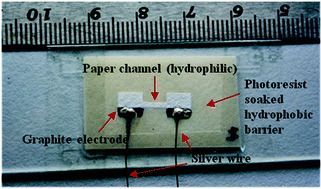We exploit the combinatorial advantage of electrokinetics and tortuosity of a cellulose-based paper network on laboratory grade filter paper for the development of a simple, inexpensive, yet extremely robust (shows constant performance for 12 days) ‘paper-and-pencil’-based device for energy harvesting applications. We successfully achieve harvesting of a maximum output power of ∼640 pW in a single channel, while the same is significantly improved (by ∼100 times) with the use of a multichannel microfluidic array (maximum of up to 20 channels). Furthermore, we also provide theoretical insights into the observed phenomenon and show that the experimentally predicted trends agree well with our theoretical calculations. Thus, we envisage that such ultra-low cost devices may turn out to be extremely useful in energizing analytical microdevices in resource limited settings, for instance, in extreme point of care diagnostic applications.
